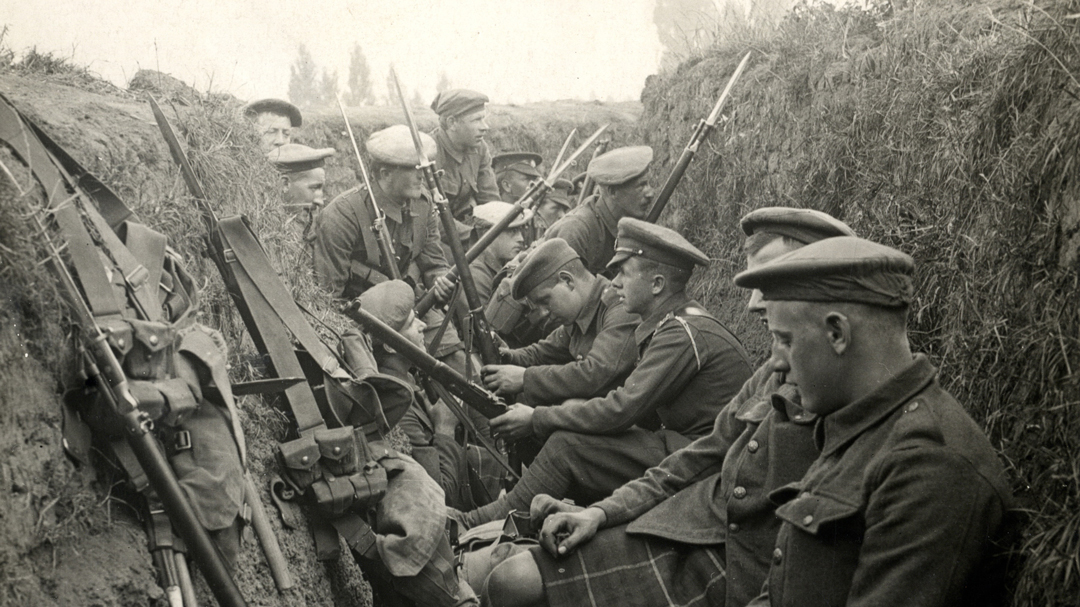Fighting for Holiness
- Jeff Crotts

Who out there does not appreciate applauding when WWII veterans are announced at an event? I recently attended a Dodgers baseball game where a WWII veteran was spotlighted right before we sang our National Anthem.
What would you do if it was a WWI veteran? An article from Smithsonian.com titled, World War I: 100 years later, The Last Doughboy of World War I is about our country’s last WWI veteran. This is the story of Frank Buckles who died on a Sunday, February 27, 2011 of natural causes. He was 110 years old and the last surviving American veteran of World War I.
Frank Woodruff Buckles was visiting the Kansas State Fair in Wichita one day in the summer of 1917 when, seeing a Marine Corps recruiting booth, he decided to enlist. The nation had just entered World War I. Buckles was only 16, but he told the recruiting sergeant he was 18. The recruiter, perhaps suspecting the boy’s real age, offered a fib of his own: he told Buckles he had to be at least 21 to become a United States Marine.
Undaunted, Buckles passed another booth and tried his luck with a Navy recruiter. He, too, turned Buckles down, saying he had flat feet, which he didn’t. Buckles would not give up. The Great War, which had started in 1914, was “an important event,” he explains. “The world was interested in it. I was interested.”
So, he traveled south to try his luck with recruiters in Oklahoma City. Again, the Marines turned him down. So did the Navy. However, an Army sergeant passed him on to a captain, who asked him for a birth certificate. “I explained that when I was born in Missouri, birth certificates were not a public record,” Buckles recalls. It would be in the family Bible. And I said, ‘You wouldn’t want me to bring the family Bible down here, would you?’ He said, ‘Go on, we’ll take you.'”
And so in August of 1917, Frank Buckles joined 4.7 million Americans recruited or conscripted for the New American Expeditionary Forces. They are all gone now [this article written 2011]—all except Buckles, who turned 107 this past February. He is the last living American veteran of the Great War.
After basic training, Buckles joined the First Fort Riley Casual Detachment and shipped out for England in December 1917. To Buckles’ dismay, his unit was held in reserve there, while others, under the command of Gen. John J. Pershing [“Jack Black” Commander of the Western Front], were in France fighting the Germans.
Buckles spent most of his time in England on a motorcycle with a sidecar, shuttling officers, delivering dispatches, driving the occasional ambulance and trying to get to the action. “I let any person who had any influence at all know that I wanted to go to France,” he says.
Finally, after six months in England, Buckles managed to get himself sent to France, where he was assigned to escort an American lieutenant—a dentist—to Bordeaux. He was in the right country, but still miles from the fighting. As the war wound down, he continued to chafe behind the lines. Buckles was still there when the shooting stopped on November 11, 1918, having claimed 8.5 million lives. “I wasn’t disappointed that the war ended,” he recalls. “I would have liked to accomplish what I had started out for.”
Buckles, [a Centenarian]…was invited to the White House…March [2008]. President George W. Bush recognized his World War I service. “That was interesting,” [Buckles] says. “I went to the White House and sat in the Oval Room, and here came President Bush…and he asked me, ‘Where were you born?’ And I said, ‘That’s exactly the words that General Pershing used,”’ when Corporal Buckles met him after the war. Asking this particular question of Buckles’ origin highlights his uniqueness. As if to ask, “Where does someone like Buckles come from? Buckles never actually saw the theater of war but he had the mentality of a fighter. His mentality was his honor!
“You then, my child, be strengthened by the grace that is in Christ Jesus, and what you have heard from me in the presence of many witnesses entrust to faithful men, who will be able to teach others also. Share in suffering as a good soldier of Christ Jesus. No soldier gets entangled in civilian pursuits, since his aim is to please the one who enlisted him.” (2 Timothy 2:1-4)










